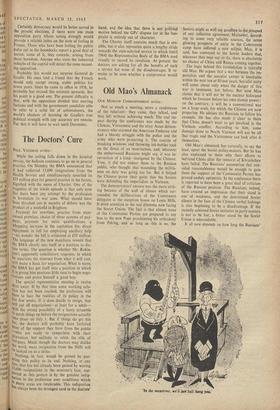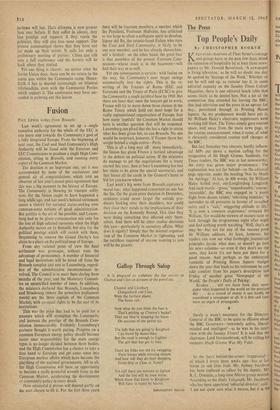Old Mao's Almanack
OUR MOSCOW CORRESPONDENT writes :
Not so much a meeting, more a rendezvous of the reluctant: they came, they talked, and they left without achieving much. The real im- pact during the conference was made by the Chinese, Vietnamese and the stray Asian demon- strators who stormed the American Embassy and had a bloody struggle with the police and the army who were protecting it. The routine of breaking windows and throwing ink-bottles took on the threat of an insurrection, and, whatever the embarrassed Russians might say, it was in- surrection of a kind—instigated by the Chinese. True, it did not endear them to the Russian public, who thought that wounding the militia- men on duty was going too far. But it helped the 'Chinese prove their point that the Soviets were defending the imperialists in Vietnam.
The demonstrators' success was the more strik- ing because of the wall of silence which sur- rounded the deliberations of the Communist delegates at the reception house on Lenin Hills. It drew attention to the real dilemma now facing the Soviet Union. The fact is that almost none of the Communist Parties are prepared to say boo to the new Pope proclaiming his orthodoxy from Peking, and as long as this is so, the Soviets might as well say goodbye to the prospect of any collective agreement. Moreover, accord- ing to some very reliable sources, the never glowing prospects of unity in the CoMmunist camp have suffered a new eclipse. Mao, it is said, has conveyed to the Soviet leaders that, whatever they may say or do, there is absolutely no chance of China and Russia coming together.
The logic behind this formulation is typically old Mao. He argues that a war between the im- perialists and the socialist camps is inevitable within the next ten or fifteen years. Socialist unity will come about only when the danger of this war is imminent, hot before. But now Mao claims that it will not be the nuclear holocaust which he forecast before his own atomic power: on the contrary, it will be a conventional war on a large scale, for which the Chinese are now preparing. He advises the Russians to follow his example. He has also made it clear to them that China doesn't want to get involved in the Vietnam conflict. According to him, some damage done to North Vietnam will not be all that tragic and the Vietnamese can look after it themselves.
Old Mao's almanack has naturally, to say the least, upset the Soviet policy-makers. But he has also explained to them why their efforts to befriend China after the removal of Khrushchev have failed. The Russians' assumption that one- sided reasonableness would be enough to gain them the support of the Communist Parties has proved unduly optimistic. In the conference there is reported to have been a great deal of criticism of the Russian position. The Russians, indeed, have created an impression that their stand is one of weakness, and the determined Soviet silence in the face of the Chinese verbal lashings is also beginning to be a disadvantage. If the recently achieved Soviet initiative in party matters is not to be lost, a firmer stand by the Soviet Union is unavoidable.
It all now depends on how long the Russians'
'In the meantime, we'll just half hang you.' patience will last. Their dilemma is now greater than ever before. If they suffer in silence, they lose prestige and support; if they rejoin the polemics, they will also lose some support. The present communiqud shows that they have not yet made up their minds. It calls for only a preliminary meeting of parties: China can still veto a full conference and the Soviets will be back where they started.
Yet one thing is clearer : no matter what the Soviet Union does, there can be no return to the status quo within the Communist camp. Hence- forth it has to depend increasingly on bilateral relationships, even with the Communist Parties which support it. The conference may have suc- ceeded in pointing out this lesson.



































 Previous page
Previous page